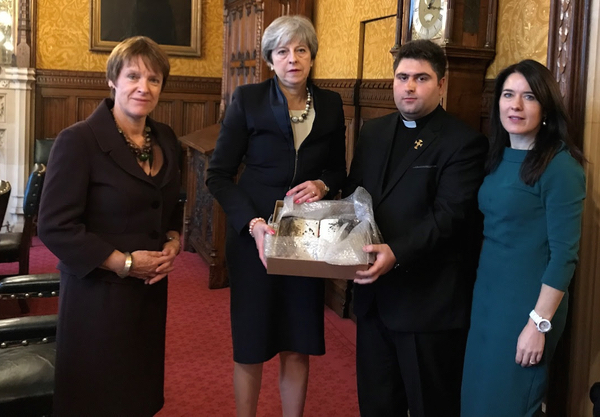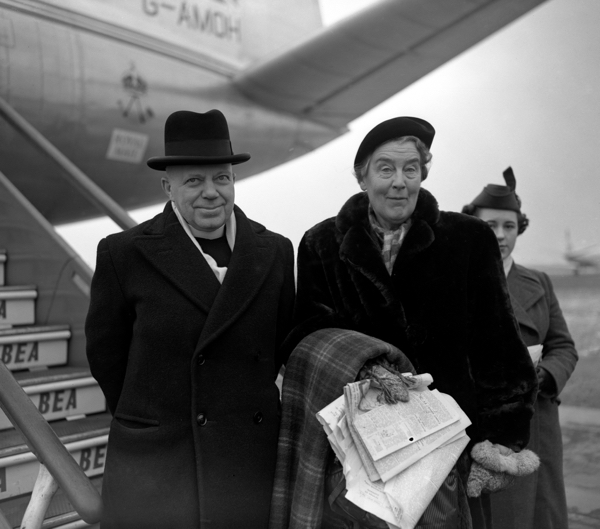The Archbishop of Canterbury today apologised for "failures" of process after the Church of England was criticised for a "rush to judgement" in the case of the late Bishop of Chichester, George Bell.
Archbishop Justin Welby apologised after a review of the Church's handling of an allegation of historic child sexual abuse by Bishop Bell concluded that "the Church of England failed to institute or follow a procedure which respected the rights of both sides".
Archbishop Welby said: “Bishop George Bell is one of the great Anglican heroes of the 20th century. The decision to publish his name was taken with immense reluctance, and all involved recognised the deep tragedy involved. However we have to differ from Lord Carlile’s point that ‘where as in this case the settlement is without admission of liability, the settlement generally should be with a confidentiality provision'. The C of E is committed to transparency and therefore we would take a different approach.
“Lord Carlile does not seek to say whether George Bell was in fact responsible for the acts about which the complaint was made. He does make significant comments on our processes, and we accept that improvement is necessary, in all cases including those where the person complained about is dead. We are utterly committed to seeking to ensure just outcomes for all. We apologise for the failures of the process.
“The complaint about Bishop Bell does not diminish the importance of his great achievement. We realise that a significant cloud is left over his name. Let us therefore remember his defence of Jewish victims of persecution, his moral stand against indiscriminate bombing, his personal risks in the cause of supporting the anti Hitler resistance, and his long service in the Diocese of Chichester. No human being is entirely good or bad. Bishop Bell was in many ways a hero. He is also accused of great wickedness. Good acts do not diminish evil ones, nor do evil ones make it right to forget the good. Whatever is thought about the accusations, the whole person and whole life should be kept in mind.”
He also concludes that the Church failed Carol when she first complained. No process of inquiry and assessment was begun.
In his review, Lord Carlile of Berriew, one of the country's top QCs, writes: "The Church, understandably concerned not to repeat the mistakes of the past when it had been too slow to recognise that abuse had been perpetrated by clergy and to recognise the pain and damage caused to victims, has in effect oversteered in this case. In other words, there was a rush to judgement: the Church, feeling it should be both supportive of the complainant and transparent in its dealings, failed to engage in a process which would also give proper consideration to the rights of the Bishop. Such rights should not be treated as having been extinguished on death."
He says it cannot be right that the reputations of the dead are "traduced" in order to protect the reputations of the living.
For Bishop Bell’s reputation to be catastrophically affected in the way that occurred was just wrong, he writes.
He adds: "In fact and in reality, his reputation was destroyed in the eyes of all but his strongest supporters."
The complaint of sexual abuse against Bishop Bell was made by a woman known as "Carol"
The review of how the Church handled the case was commissioned a year after Bishop of Chichester Martin Warner issued an apology to Carol in September 2015. This was followed by a public statement made by the Church of England and in the same period, the Church paid her damages of £16,800 and £15,000 legal costs.
Lord Carlile writes that Bishop Bell was treated as having been guilty. He also notes that no-one other than Carol has come forward to make allegations against Bishop Bell, despite the widespread publicity which the case has received.
In the meantime, many journalists and commentators have written articles in support of Bishop Bell, including Charles Moore, former editor of The Telegraph.
Lord Carlile makes clear that the purpose of his review is not to determine the truthfulness of Carol, nor the guilt or innocence of Bishop Bell.
The review was set up to examine the procedures followed by the Church of England, the way it obtained and assessed evidence in the case, and whether it was right to make a public statement of apology and pay damages.
Lord Carlile says the Church of England acted throughout in "good faith" and was motivated by a desire to do what it perceived to be the right thing by the complainant.
Bishop Bell was a figure of huge eminence. Among his many achievements, he was supported TS Eliot in his writing of Murder in the Cathedral. He was appointed Bishop of Chichester in 1929 and in the 1930s became an influential advocate for Christians and Jews in Germany, contributing to the work and survival of noted priests and to the exposure of Nazi atrocities. He died in 1958.
Lord Carlile writes: "After his death, his already considerable reputation soared. Various institutions and other things were named in his honour. Above all, he was given a ‘Name Day’ by the Church; this was described to me by current senior clergy as the nearest thing in the Church of England to beatification. No allegations of sexual or other impropriety were made against him during his lifetime. The first allegation was that made by Carol in 1995, 37 years after his death."
Bishop Peter Hancock, the Church of England's safeguarding bishop, responded: “We are enormously grateful to Lord Carlile for this ‘lessons learned’ review which examines how the Church handled the allegations made by Carol in the 1990s, and more recently. Lord Carlile makes a number of considered points as to how to handle such cases in future and we accept the main thrust of his recommendations.
“In responding to the report, we first want to acknowledge and publicly apologise again for the Church’s lamentable failure, as noted by Lord Carlile, to handle the case properly in 1995."
Bishop of Chichester Martin Warner said: "The emotive principle of innocent until proven guilty is a standard by which our actions are judged and we have to ensure as best we can that justice is seen to be done. Irrespective of whether she is technically a complainant, survivor, or victim, ‘Carol’ emerges from this report as a person of dignity and integrity. It is essential that her right to privacy continues to be fully respected. The good deeds that Bishop George Bell did were recognised internationally. They will stand the test of time. In every other respect, we have all been diminished by the case that Lord Carlile has reviewed.”
In its own response the Bell Group, which has campaigned to restore the reputation of Bishop Bell, says: "His devastating criticism of the Church’s process shows that Archbishop Welby was wrong in 2016 when he described the investigation as ‘very thorough’ and the finding of abuse as clearly correct on the balance of probabilities. A close reading of the detail of Lord Carlile’s report can only lead to the conclusion that he has thoroughly vindicated the reputation of man revered for his integrity across the Christian Church."
The group adds: "The time has now come for the Church of England to redress, without hesitation or qualification, the immense damage done to the fine reputation of a man who served it for so long and with such courage and devotion. Those institutions which summarily removed Bell’s name from their titles should now fully restore it."
(Pic: The Rt. Rev. G.K.A. Bell, Bishop of Chichester, with his wife Henrietta Livingstone at London Airport as, in a snowfall, he was about to leave for Frankfurt, Germany. The bishop was regarded as the Church of England's "Foreign Secretary" owing to his interest in foreign affairs. Credit: PA Archives.)



 Loading ...
Loading ...